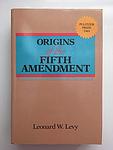Leonard W. Levy
Leonard W. Levy was a prominent American historian and constitutional scholar, known for his expertise in American constitutional history and civil liberties. He authored several influential books, including 'Origins of the Fifth Amendment', which won the Pulitzer Prize for History in 1969. His work often explored themes of judicial review, freedom of speech, and the development of legal institutions in the United States.
Books
This list of books are ONLY the books that have been ranked on the lists that are aggregated on this site. This is not a comprehensive list of all books by this author.
-
1. Original Intent And The Framers' Constitution
"Original Intent and the Framers' Constitution" critically examines the concept of originalism, the judicial approach that interprets the U.S. Constitution based on the intent of its framers. The book delves into historical records, including the Federalist Papers and Constitutional Convention debates, to assess whether the original intentions of the framers can be definitively understood and should guide contemporary constitutional decisions. The author argues that the framers' intentions are not only ambiguous but that they also anticipated the Constitution to be a living document, adaptable to changing societal needs rather than bound by historical constraints. This work challenges the validity of originalism in modern judicial review and underscores the complexities of applying historical intentions to contemporary issues.
The 8040th Greatest Book of All Time -
2. Origins of the Fifth Amendment
This book explores the history and origins of the Fifth Amendment of the United States Constitution, which protects individuals from self-incrimination among other rights. The author delves into the legal, political, and social contexts that led to the amendment's creation, providing a comprehensive analysis of its significance in the American legal system. The book also examines the amendment's influence on the concept of individual rights and its impact on subsequent legal developments.
The 11112th Greatest Book of All Time

